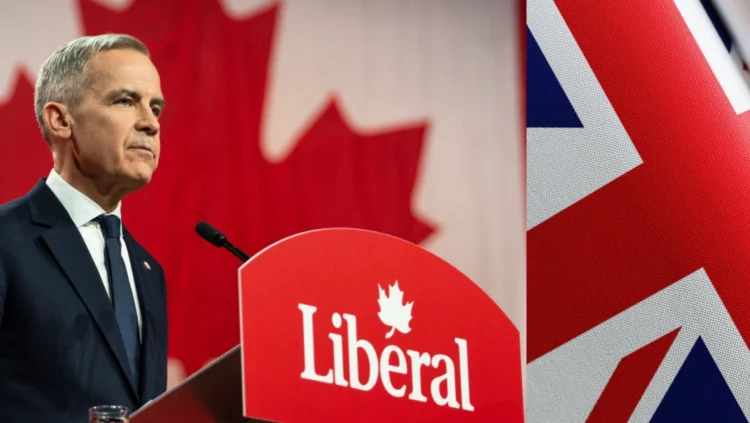Liberal Leader Points to Central Banking Career to Bolster Economic Credibility in Election Campaign
Liberal leader Mark Carney is drawing a sharp line between experience and ideology as he faces off against Donald Trump’s aggressive tariff regime and a heated federal election campaign. During a stop in Oakville, Ontario on Saturday, Carney told supporters that his time as Governor of the Bank of England during the Brexit crisis has uniquely equipped him to navigate Canada through the current trade war with the United States.
Carney didn’t hold back in comparing Trump’s tariffs on Canadian auto and industrial goods to Britain’s economic self-sabotage during its break from the European Union.
“The U.S. is harming themselves with these tariffs,” Carney said. “It takes time for the damage to show—just like Brexit. But I’ve seen this movie before. I know exactly what’s going to happen.”
Table of Contents
Tariffs Mirror Brexit: Carney Predicts Economic Blowback for the U.S.
Drawing Parallels from 2016
As the first non-British governor of the Bank of England, Carney was at the heart of the United Kingdom’s economic debate during the 2016 Brexit referendum. His warnings about the economic fallout earned him political backlash from pro-Brexit forces, but the long-term effects largely vindicated his caution.
Now, Carney sees history repeating itself—this time across the Atlantic.
“Like Brexit, the consequences of these U.S. tariffs will ripple across borders. The U.S. economy will weaken, and Canada will be pushed to diversify and expand its global trade relationships,” he said.
Canada Responds to Trump’s Trade Blitz
While Trump’s most recent tariff escalation targeted a broad group of countries, Canada has borne the brunt of specific punitive measures, particularly on automobiles, steel, and aluminum.
In response, Ottawa launched 25 percent counter-tariffs on U.S. goods that comply with the CUSMA (United States-Mexico-Canada Agreement) framework but contain non-Canadian components.
The federal government’s total retaliation now amounts to $60 billion, a figure Liberal officials say is aimed at keeping global manufacturers invested in Canada despite rising cross-border costs.
Oakville’s Auto Industry in the Spotlight
Ford’s Commitment Reassures Local Workers
At his Oakville campaign stop—just minutes from a Ford plant currently shut down for retooling—Carney addressed concerns about the future of Canadian auto jobs.
He revealed he had spoken with Ford CEO Jim Farley earlier in the week and received a personal pledge that the Oakville facility would reopen and continue operations in Canada.
“That plant will reopen,” Carney said. “They’re committed to Canada.”
Stellantis Layoffs Highlight Economic Fragility
Meanwhile, Trump’s tariffs have already hit another Canadian automaker, Stellantis NV, which announced temporary production halts and mass layoffs across its Canadian, American, and Mexican plants. The car manufacturing sector, long a symbol of North American integration, is now at risk of unraveling.
Carney Campaign Emphasizes Experience in Crisis Management
From Brookfield to Bank of Canada to Brexit
Carney’s campaign strategy hinges on promoting his credentials as an economist and business leader. Prior to entering politics, he chaired Brookfield Asset Management, one of the world’s largest investment firms, and previously led both the Bank of Canada and the Bank of England.
Liberals argue that this depth of experience gives Carney an edge in handling volatile global markets and responding to Trump’s unpredictability.
Conservative Pushback: “A Résumé Is Not a Plan”
However, Conservative Leader Pierre Poilievre has dismissed Carney’s background as insufficient, saying “a résumé is not a plan.” Poilievre has repeatedly questioned Carney’s decision to place his investments in a blind trust rather than fully divest, warning of potential conflict-of-interest issues if he becomes prime minister.
Carney, for his part, has fired back.
“Mr. Poilievre is the kind of career politician who worships the free market despite never having to make a payroll,” he said Saturday.
Liberals Pitch Skilled Trades Support as Economic Shield
Promises on Apprenticeships and Training
Alongside his broader economic messaging, Carney used his Oakville stop to outline new skilled trades policies aimed at bolstering Canada’s labor force.
He pledged to:
- Increase the Apprenticeship Grant to a maximum of $8,000
- Double funding for the Union Training and Innovation Program to $50 million annually
- Create a $20 million capital stream to expand college training spaces
These initiatives are aimed at future-proofing Canadian workers against economic disruption and trade volatility.
Opposition Leaders Present Contrasting Visions
Poilievre Targets Red Tape in B.C.
Campaigning in British Columbia, Poilievre proposed a sweeping bureaucracy reduction plan, vowing to cut red tape by 25 percent in two years. He promised that any new administrative costs would be offset by double the savings elsewhere, framing the move as a lifeline for small businesses.
Singh Focuses on Healthcare Gaps in Atlantic Canada
Meanwhile, NDP Leader Jagmeet Singh was in St. John’s, Newfoundland and Labrador, where he pledged to ensure every Canadian has access to a family doctor by 2030.
The NDP proposes adding up to 7,500 family doctors over five years at a cost of $10 billion. Singh framed the commitment as part of a broader push for universal, accessible public healthcare.
Looking Ahead: Trade, Trust, and Turbulence
The Liberals are betting that Carney’s blend of global financial experience and tough economic messaging will resonate with voters in a time of uncertainty. With Trump’s tariffs escalating, Canada’s auto industry reeling, and alliances fracturing, the stakes in this election go beyond domestic politics—they touch on the future of Canada’s place in the world economy.
As Carney put it:
“In this moment of instability, experience matters.”
